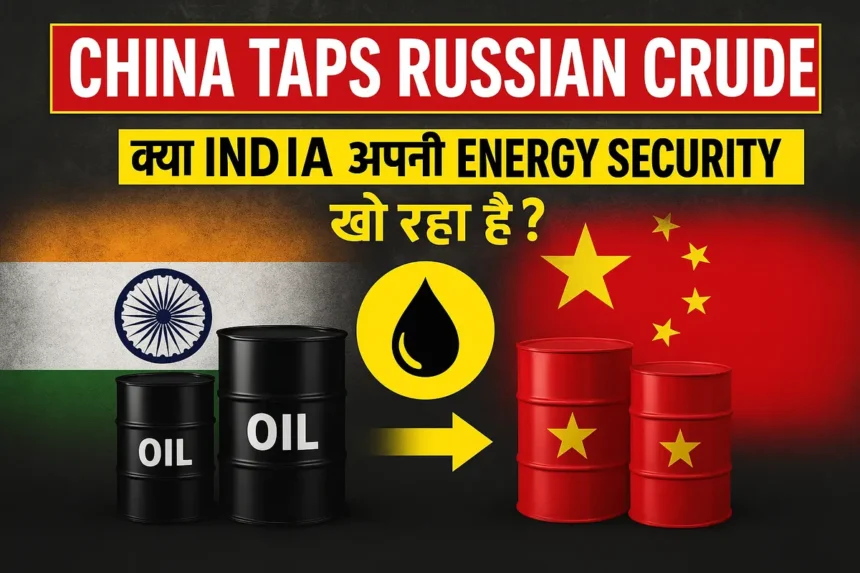The current global geopolitical situation is creating a very difficult environment for India. On one hand, the U.S. had initially imposed a tariff of 25% on India, which has now been increased to 50%. On the other hand, China Taps Russian Crude is buying huge quantities of Russian Crude Oil at a discount.
At the same time, the U.S. is preventing other countries from buying crude oil from Russia, but amidst all this, China Taps Russian Crude is easily taking advantage of the situation.
This is because China is tapping Russian crude, and Russia is now giving oil to China at a discount. On the other hand, India does not want to take any hasty steps that may have a negative effect on India’s economy in the future. threat, India is not taking any firm steps regarding imports, and because of this, India’s energy market is being heavily affected.
India’s Reaction to American Pressure
The Trump administration has imposed a 50% tariff on India, with the main condition that it should not buy oil from Russia. This tariff will be applied from August 27.
Due to the tariff, India had slowed down its imports, but due to the ongoing war between Russia and Ukraine, Russia has started selling crude oil at a discount to keep its economy running properly.
Because of this, Indian oil companies have started importing again. U.S. Treasury Secretary Scott Bessent has accused India of buying more crude oil from Russia at a discount than before. Bessent has alleged that India is currently buying oil at a discount and selling it to other countries at a higher rate, and by doing so, it has made an extra profit of $16 billion.
China Takes Advantage of Discounted Oil
Looking at the current situation, India is quite afraid and is thinking many times before taking any step forward.
Due to all this pressure and the U.S. tariff threats, India has stopped buying crude oil, while China Taps Russian Crude, has more than doubled its imports. It is heard that China has booked more than 15 oil shipments that India did not buy.
Now, Chinese refining companies have stocked up for the next October and November, and they have also booked for the coming time. Because of all this, China is now buying directly from Russia at a cheap rate instead of expensive oil from the Middle East.
Russia’s Role and Trilateral Talks
According to the latest update, there is news that Russia has promised to support India and said that it will not stop giving its oil to India; it will continue. The simple solution to the current situation is to compromise among ourselves.
The U.S. wants no one to buy Russia’s oil, which would weaken Russia’s economy and make it stop its attack on Ukraine. Indirectly, it is imposing tariffs on India so that India does not buy oil. In this current environment, India is taking advantage with great intelligence.
It is currently buying oil from Russia at a cheap rate so that it can increase its energy and reduce inflation in the country. Due to the tariffs, India has currently reduced its oil imports but has not stopped them.
If India buys oil from Russia at a cheap rate, it can grow its economy very fast because many sectors are linked to oil, which directly contribute to India’s economy.
Conclusion:
The current situation is that the Trump government’s pressure through tariff threats is directly telling India that if it does not stop importing oil from Russia, a 50% tariff will be imposed, which was previously 25%.Because of this, India is being very careful, as oil directly supports the growth of India’s economy.
Amidst all this, China Taps Russian Crude is heavily importing discounted Russian crude oil. China used to buy it at an expensive price through the Middle East, but now it has bought a lot and has also booked future orders.
According to the data, China has booked more than 15 shipment containers. The “mutual adjustment” game, which is currently taking place due to the war between Russia and Ukraine, sees Russia selling oil at a huge discount to maintain its economy. However, America is threatening to impose tariffs on all the countries that are major importers of Russian oil.
Hello everybody! If you’ve read this article, you’re probably interested in investing in stocks for 2025. But we request you to do your research before buying any stock or investing under the guidance of an expert. For more such knowledgeable articles, follow 360storyline – Financial Process Buddy.
FAQ – on China Taps Russian Crude
1. Why has the U.S. imposed a 50% tariff on India?
The U.S., under the Trump administration, has imposed a 50% tariff on India with the main condition that India should not buy crude oil from Russia. This move is aimed at discouraging India’s imports of Russian crude. The tariff, which will be applied from August 27, is directly connected to America’s strategy of weakening Russia’s economy by reducing its oil sales.
2. How is China benefiting while India is being cautious?
While India has slowed down its oil imports due to U.S. tariff threats, China Taps Russian Crude and has more than doubled its imports. China has already booked more than 15 oil shipments that India did not purchase. Chinese refining companies have stocked oil for October and November at a discounted price, directly from Russia, instead of relying on the expensive Middle Eastern oil.
3. What role is Russia playing in India’s oil imports?
India’s old friend, Russia, has supported an uninterrupted supply of oil to New India. This word works as a bridge between two countries. Despite the U.S. pressure, India is still importing Russian oil at a discount to control inflation and support its economy, although it has reduced its imports to avoid the full impact of the tariffs.
Disclaimer
All the information on this website 360storyline.com is for educational and informational purposes only. We share updates on the stock market, crypto, finance, commodities, and success stories–but this is not investment advice. Please talk to a financial advisor before making any investment decisions. Markets have risks–there can be profit or loss. By using this website, you fully accept and agree to this Disclaimer.
I am a stock market and finance researcher with a strong interest in Indian equities. focuses on analyzing penny stocks, multibagger opportunities, and market trends to provide simple and practical insights for investors. Through my research, My aims to help readers understand the stock market better and make informed financial decisions.




















